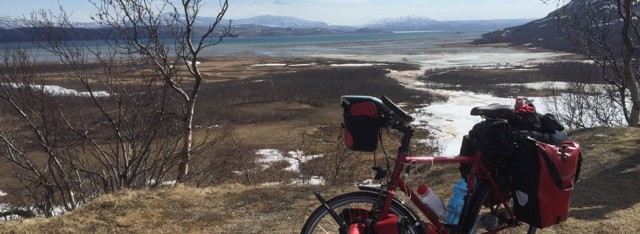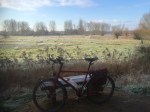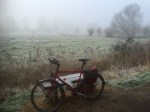I’m not entirely sure where I’m going with this blog, but bear with me. I guess this post might upset a few people.
‘You’re waking up,’ or ‘you’re awake now,’ is an expression I’ve seen used a few times recently, and which has been addressed to me several times over the last few years. I sometimes think it’s a bit odd, and slightly insulting as it suggests one has been ignorant and maybe selfish in the past, however perhaps that’s spot on.
I was pondering this on my way to work this morning. I try to pause on my daily cycle commute, in a quiet spot, to contemplate the day ahead, go over anything that’s worrying me, or just to relax in the presence of nature before heading to the office. Forcing myself to stop for a few minutes puts me in a better frame of mind for the day ahead, and I’m lucky enough to have some pretty countryside to pedal through on my route in.
- Today’s spot for a pause for thought
- Sunshine, clean air, frost and birds singing
- Blackthorn blossom abundant
This morning was beautiful, with birds singing, the air clean and fresh, and Blackthorn blossom all over the place. A few days ago the same route looked like this, still captivating but slightly chillier.
- Jack Frost plays his hand
- Winter’s icy grip returns
- A landscape transformed
At the moment it feels like we might be on the brink of a big shift in thinking, a radical evolution in common consciousness, as people re-evaluate their priorities around wealth, happiness, security and sustainability. At least this is what I’m hoping, and am encouraged to believe as I read similar posts and comments from around the world, or talk with friends who think the same thing. I guess in the Western world we’re fortunate to be in a stable and wealthy enough position, compared to a lot of other places on the planet anyway, to have the luxury of contemplating such things, however unless the majority have this shift in perceptions, regardless of personal circumstances, I can’t see how in the medium to long-term the human race isn’t doomed to extinction, along with a lot of other species on Earth. A lot of the stuff we think is important at the moment, really isn’t, in the grander scheme of things, for example #firstworldproblems
Over the past couple of weeks several scientific sources, including NASA, have reported on how global temperature averages have risen extraordinarily, with the hottest January on record experienced in the Arctic, oceans warming up, sea and glacial ice melting at rapid rates, mass coral die offs due to bleaching, and graphs indicating the temperature rises are likely to continue. This is all pretty bad Ju-Ju, as it looks like these temperature increases are locked in, so we’ll see sea levels rise over the next century, swamping coastal cities and causing huge population migrations inland; bye-bye London and New York, just two of the cities that’ll be impacted. It’s probably too late to do anything about this, despite the Paris COP21 agreement, as the changes we’re seeing are a bit of a vicious circle; warming oceans mean less CO2 is absorbed, melting ice means there’s less about to reflect heat back into the atmosphere and space, permafrost melting releases more Greenhouse gases, Jet Stream disruptions and continuing El-Nino effects lead to more frequent violent storms; I could go on.
I mentioned the Paris COP21 agreement, and am hopeful this will have a positive impact, however I remain deeply suspicious that those in charge, and the fossil fuel industries that are under threat from Green initiatives, won’t comply with the targets that have been set, or that they’ll find excuses to bend the rules, all for the sake of profit; there are already challenges to it going on in the States, and who knows what happens in China. Even if we hit the targets it’s looking increasingly likely we won’t avert some of the dramatic changes being predicted. Fingers crossed the last dozen or so years, or even one hundred, have just been a blip.
If I was a conspiracy theorist I might suggest that the world’s elite actually want it this way. Maybe they’ve realised the planet is in for a tough time ahead, and the best thing to do to ensure their survival is to make hay whilst the sun shines, at the expense of 99.9% of the rest of the planet. Maybe they’re hoping a big plague will come along and wipe out the excess population that’s causing the rapid use of available resources, harmful pollution, and habitat destruction. Maybe that’s why governments keep getting involved in, and seemingly escalating, conflicts in the Middle East, to ensure things remain unstable and in the hope of provoking more widespread conflict they can profit from in the short-term, and in the long-term by there being fewer people around.
Thankfully I’m not really a conspiracy theorist, and simply don’t believe that the world’s top 0.1% either get on well enough, are organised or intelligent enough, or can keep secrets well enough in the age of social media, to pull something like that off. Does make you think though.
One thing that does seem evident is that this shift in consciousness needs to continue, away from materialism and how much one earns or owns being the measure of one’s worth, back to family, community and life’s experiences being what people set their stall by. It feels like we need to change our sense of entitlement on what’s available for us to take and use, and what we take for granted every day. Technological progress isn’t always a good thing if it means we’re creating more junk for people to buy that they don’t really need, and which will end up filling landfill sites in a few years. I mean who the f*ck needs to toothbrush that has a bluetooth connection…#extremecivilisation
I’m hoping that we’ll see more people start to really question their day-to-day practices. Do I really need to make that car journey, or could I walk or use a bike? Could I avoid buying that packaged meal or bottle of drink and find non-packaged alternatives instead, that may well be cheaper anyway? Do I need to take a flight to go on holiday? Do I need to need to use baby-wipes that take years to degrade and pollute our seas, or could I use a cloth and wash it? Same with disposable nappys, which the human race got on perfectly fine without for millennia? The list of questions can go on for a long time.
I saw San Francisco has banned the sale of one use plastic bottles, a simple and brave step in the right direction, that’ll no doubt upset a few people but is the right thing to do. Hopefully that’ll happen in more places. I’ve said this before in a blog, but I wonder if in 50 or 100 years time people will look back with incredulity at our generation(s), at how wasteful we were? How could we have thought that making something for a one-time-only use was a good idea? Or burning fossil fuels at the expense of people’s health and the environment was acceptable?
It seems evident we can’t really trust those in charge; the politicians with their short-term and vote seeking agendas (not all of them I admit, but a significant proportion), the ‘captains’ of certain industries that are only driven by profit, the deluded individuals trying to convince people that nothing is really wrong.
But people are waking up to these issues and the fact we can’t continue on this unsustainable path anymore. The mass shift in consciousness is happening, although it’s still got a way to go. The only way we can make things happen and create a better world, is by making our own changes, and encouraging others to do so, and by making those in charge or in positions of power realise we won’t just stand by and let them plunge our world, and the world of future generations, into an abyss.
It’d be great if this blog woke up just a few people, who in turn woke up a few more, along with 1000’s of others looking for positive change. I’d love to hear about people making changes in their own lives for the positive, and how they’re pushing back versus the ‘establishment’ to make them realise we won’t sit idly by.
Are you awake yet?
P.S. If you don’t here from me for a while it’s probably because the aliens, who are the ones really in charge, hence why the planet is being stripped, have kidnapped me and are no doubt inserting probes as you read this. Bonuit. #conspiracytheoryalert








